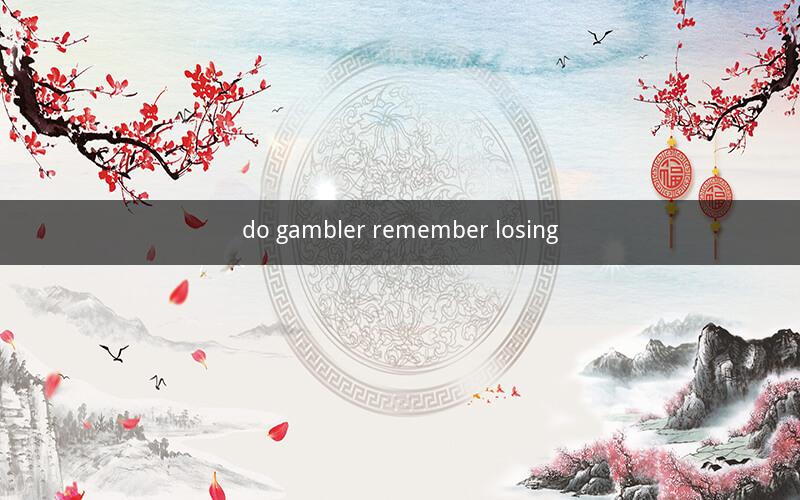
Table of Contents
1. Introduction
2. The Psychology of Memory
3. Factors Influencing Memory
4. The Role of Emotion
5. The Impact of Gambling on Memory
6. Case Studies
7. Conclusion
1. Introduction
Memory is a complex cognitive process that allows us to store, retain, and retrieve information. However, memory is not perfect, and it is influenced by various factors. One intriguing question is whether gamblers remember losing. This article explores the psychology behind memory, the factors that influence it, and the specific context of gambling.
2. The Psychology of Memory
Memory is divided into three main stages: encoding, storage, and retrieval. During encoding, information is transformed into a format that can be stored in the brain. Storage involves maintaining this information over time, and retrieval is the process of accessing the stored information when needed.
3. Factors Influencing Memory
Several factors can affect memory, including age, attention, and emotional state. For example, older adults tend to have more difficulty with memory compared to younger individuals. Attention plays a crucial role in encoding information, as it helps to ensure that the information is processed effectively. Additionally, emotional experiences can either enhance or impair memory.
4. The Role of Emotion
Emotion plays a significant role in memory. When we experience strong emotions, such as excitement or fear, the associated information is more likely to be encoded and stored in the brain. In the context of gambling, the potential for winning can create a strong emotional response, which may lead to better memory of winning experiences compared to losing ones.
5. The Impact of Gambling on Memory
Gambling is an activity that involves risk and the potential for both winning and losing. The emotional consequences of these outcomes can have a significant impact on memory. For example, a gambler may remember a winning experience more vividly than a losing one due to the stronger emotional response associated with winning.
However, the memory of losing can also be influenced by various factors. For instance, a gambler may remember losing more vividly if they were playing with a significant amount of money or if they were under significant stress. Additionally, the frequency of losing experiences can also affect memory, as gamblers may become more sensitive to these experiences over time.
6. Case Studies
Several case studies have explored the memory of gamblers, particularly in the context of losing. One study found that gamblers were more likely to remember losing when they were under stress or when they were playing with a significant amount of money. Another study suggested that gamblers may remember losing more vividly if they were playing against someone they knew or if they were playing in a familiar environment.
7. Conclusion
In conclusion, the memory of gamblers is influenced by various factors, including the role of emotion and the specific context of gambling. While gamblers may remember winning experiences more vividly due to the stronger emotional response, the memory of losing can also be affected by various factors, such as stress, the amount of money at stake, and the frequency of losing experiences.
Questions and Answers:
1. How does the brain encode information?
The brain encodes information by transforming it into a format that can be stored in the brain. This process involves various cognitive functions, such as attention, perception, and association.
2. What role does attention play in memory?
Attention plays a crucial role in memory by ensuring that information is processed effectively. When we pay attention to something, we are more likely to encode and store it in our memory.
3. Can emotional experiences improve memory?
Yes, emotional experiences can enhance memory. When we experience strong emotions, such as excitement or fear, the associated information is more likely to be encoded and stored in the brain.
4. How does gambling affect memory?
Gambling can affect memory by creating strong emotional responses, which may lead to better memory of winning experiences compared to losing ones.
5. Why might gamblers remember losing more vividly in certain situations?
Gamblers may remember losing more vividly in certain situations due to factors such as stress, the amount of money at stake, and the frequency of losing experiences.
6. Can memory be influenced by the environment in which we are gambling?
Yes, the environment in which we are gambling can influence memory. For example, gamblers may remember losing more vividly if they were playing in a familiar environment or against someone they knew.
7. How can gamblers improve their memory of losing experiences?
Gamblers can improve their memory of losing experiences by taking note of the specific circumstances surrounding each experience, such as the amount of money at stake and the emotional state they were in.
8. Can memory be affected by the frequency of losing experiences?
Yes, the frequency of losing experiences can affect memory. Gamblers may become more sensitive to these experiences over time, leading to better memory of losing situations.
9. How can stress affect memory?
Stress can impair memory by disrupting the encoding, storage, and retrieval processes. When we are under stress, it can be more difficult to pay attention to and process information effectively.
10. Can memory be influenced by the social context of gambling?
Yes, the social context of gambling can influence memory. Gamblers may remember losing more vividly if they were playing with someone they knew or if they were part of a group of gamblers.